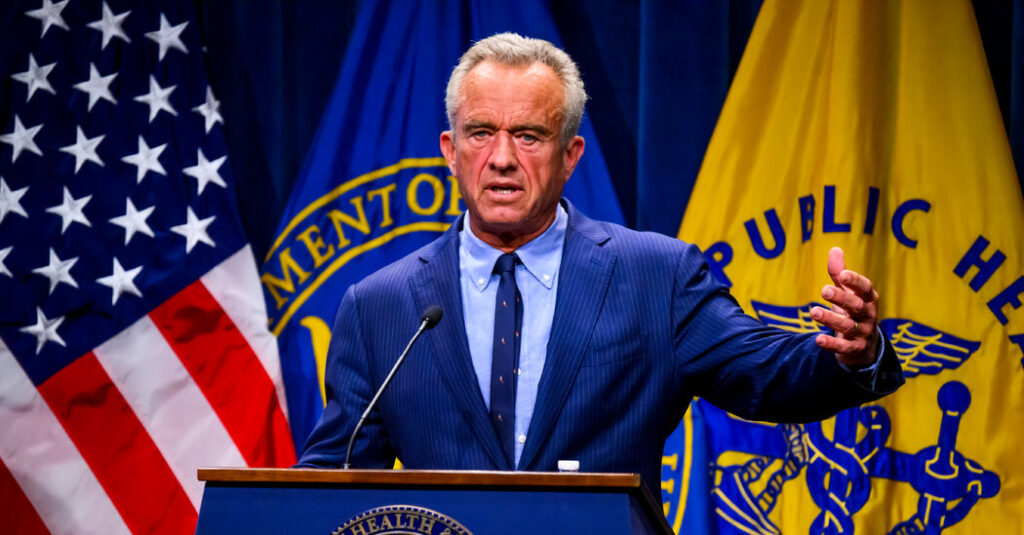With the United States facing its largest single measles outbreak in 25 years, Health and Human Services Secretary Robert F. Kennedy Jr. will direct federal health agencies to explore potential new treatments for the disease, including vitamins, according to an H.H.S. spokesman. The decision is the latest in a series of actions by the nation’s top health official that experts fear will undermine public confidence in vaccines as an essential public health tool.
The announcement comes as Mr. Kennedy faces intense backlash for his handling of the outbreak. It has swept through large areas of the Southwest where vaccination rates are low, infecting hundreds and killing two young girls. On Friday, the Centers for Disease Control and Prevention reported more than 930 cases nationwide, most of which are associated with the Southwest outbreak.
Critics have said Mr. Kennedy has focused too much on untested treatments — such as cod liver oil supplements — and offered only muted support for the measles vaccine, which studies show is 97 percent effective in preventing infection.
The decision to put more resources into potential treatments, rather than urging vaccination, could have grave consequences at the center of the outbreak.
“We don’t want to send the signal that you don’t have to get vaccinated because there’s just a way to get rid of it,” said Jennifer Nuzzo, an epidemiologist at the Brown University School of Public Health.
Scientists have already thoroughly studied various vitamins and medications as potential treatments for measles, said Michael Osterholm an epidemiologist at the University of Minnesota.
Decades of research have turned up no miracle treatment for the measles virus, which can cause pneumonia, making it difficult for patients to get oxygen into their lungs, and brain swelling, which can cause blindness, deafness and intellectual disabilities.
“It’s not that there’s been a lack of studies,” he said.
Measles patients are typically offered “supportive care” to help make them more comfortable while the virus runs its course, like Tylenol to bring down their fever, supplemental oxygen and IV fluids.
The decision to look for new treatments is meant to help people who chose not to vaccinate, the H.H.S. spokesman, Andrew Nixon, said. He added that the C.D.C. still recommends the measles, mumps and rubella shot as the most effective way to prevent measles.
But, he said, “Our commitment is to support all families, regardless of their vaccination status, in reducing the risk of hospitalization, serious complications and death from measles.”
As an example of such a community, Mr. Kennedy pointed to the Mennonites in West Texas, who have experienced the brunt of the cases and hospitalizations in the current outbreak.
Mr. Nixon said the C.D.C. will collaborate with universities to test new treatments for a “host of diseases,” which may include a combination of existing drugs and vitamins. The news of this effort was first reported by CBS News.
Public health experts were baffled by Mr. Kennedy’s decision to hunt for new treatments, rather than endorse shots that have decades of safety and efficacy data. They said this seemed to contradict his longstanding focus on disease prevention instead of treatment.
“This is akin to saying, ‘Go ahead and eat whatever you want, don’t exercise, smoke like a chimney — we’re going to invest all of our resources in heart transplants,’” said Dr. Jonathan Temte, a former chairman of the C.D.C.’s vaccine advisory committee.
Over the course of the current measles outbreak, Mr. Kennedy has offered inconsistent, and at times contradictory, messaging about the M.M.R. shot. At some points, he has described the vaccine as “the most effective way to prevent the spread of measles.”
Other times, he has questioned its safety: “We don’t know the risks of many of these products because they’re not safety tested,” he said in an interview with CBS News last month.
Doctors in West Texas have said Mr. Kennedy’s focus on treatments, rather than vaccines, has already made their jobs difficult.
Early in the outbreak, he said on Fox News that he had heard of “almost miraculous and instantaneous recovery” with treatments like cod liver oil, which he said was “the safest application of vitamin A.”
While doctors sometimes administer high doses of vitamin A in a hospital to manage severe measles, experts do not recommend taking it without physician supervision.
Shortly after, doctors said they had encountered measles patients who had delayed critical medical treatment in favor of staying home and treating themselves with some of the supplements Mr. Kennedy promoted. Some children with measles were given toxic levels of vitamin A, they said.
Dr. Osterholm said Mr. Kennedy’s plan also assumed that people’s beliefs about vaccines were fixed, when in reality, clear information about their purpose and safety had encouraged thousands of vaccinations in past outbreaks.
Despite Mr. Kennedy’s claims that Mennonites have “religious objections” to shots because they contain “fetus debris,” historians who study the community say it has no religious doctrine that bans vaccination, and vaccine experts say there is no fetal tissue in the M.M.R. shot.
Local doctors have instead pointed to misinformation about the safety of the shot — which Mr. Kennedy has helped perpetuate — as the primary reason their Mennonite patients opt their children out of vaccination.


